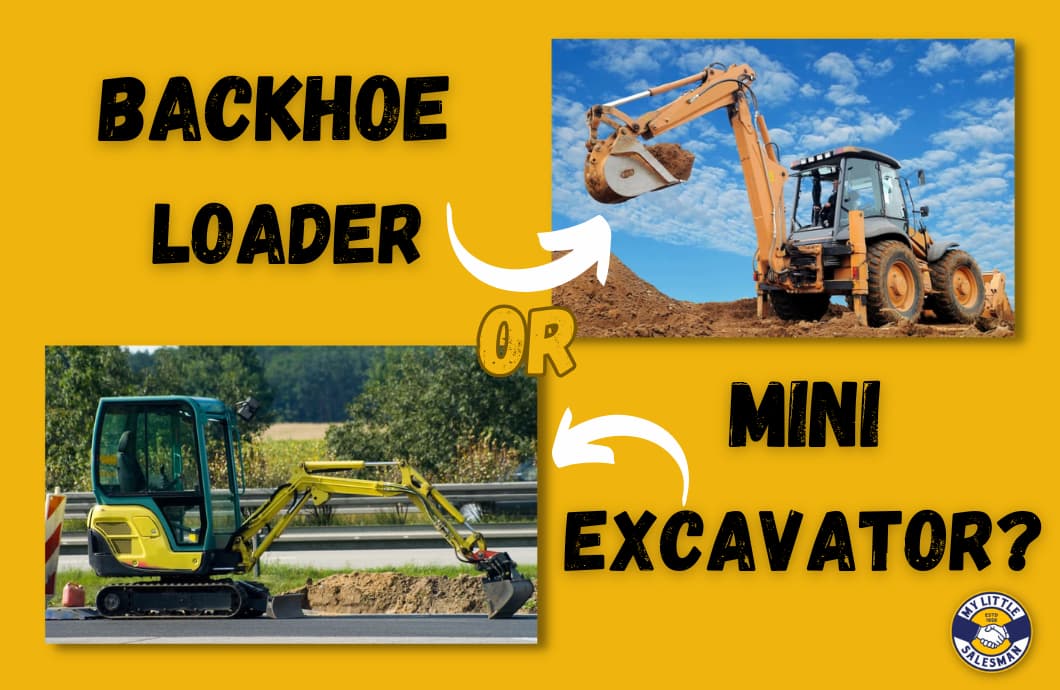
Backhoe or mini-excavator? That is the heavy equipment question.
Contents
Ever wondered whether a backhoe or a mini excavator is right for your needs—whether a construction project, for landscaping, or farm use in agriculture?
In order to make an informed decision between a backhoe and a mini excavator, it is essential to compare their sizes, costs, and use cases.
Let's hop into a detailed comparison between backhoes and mini excavators—helping you to make an informed decision for your next project.
But first, let's first define both of these types of heavy equipment.
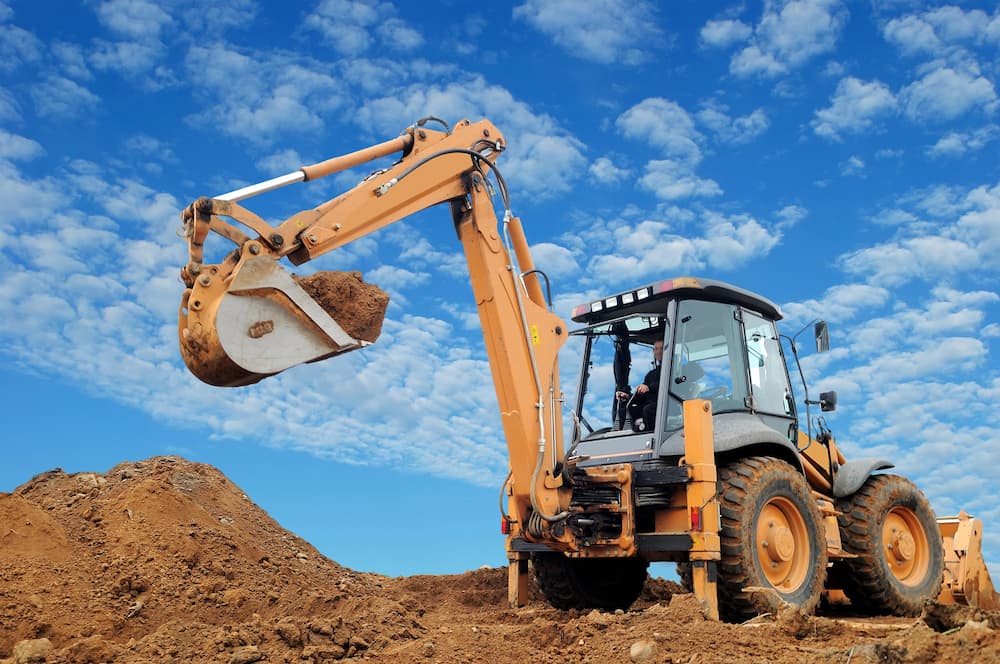
A backhoe, often referred to as a backhoe loader, is a tractor-like multi-purpose piece of heavy equipment commonly used on construction sites, farms, or landscaping projects.
A backhoe is distinguished by its two primary functions: (a) a loading bucket at the front and (b) a digging arm, or backhoe, at the rear.
The backhoe arm comprises a stick, boom, and bucket with an array of attachment options. As a piece of equipment with both a capable digging arm as well as a front-mounted loading bucket, backhoes are adept at both excavation and loading tasks.
Basic Backhoe Specifications:
- Digging Depth: 12-16 feet on average
- Rotation Ability: Approximately 180-200 degrees
- Operating weight: 7,000 - 20,000 pounds, depending on the model
Backhoe loaders are outfitted with stabilizer outrigger arms to provide stability on uneven terrain.
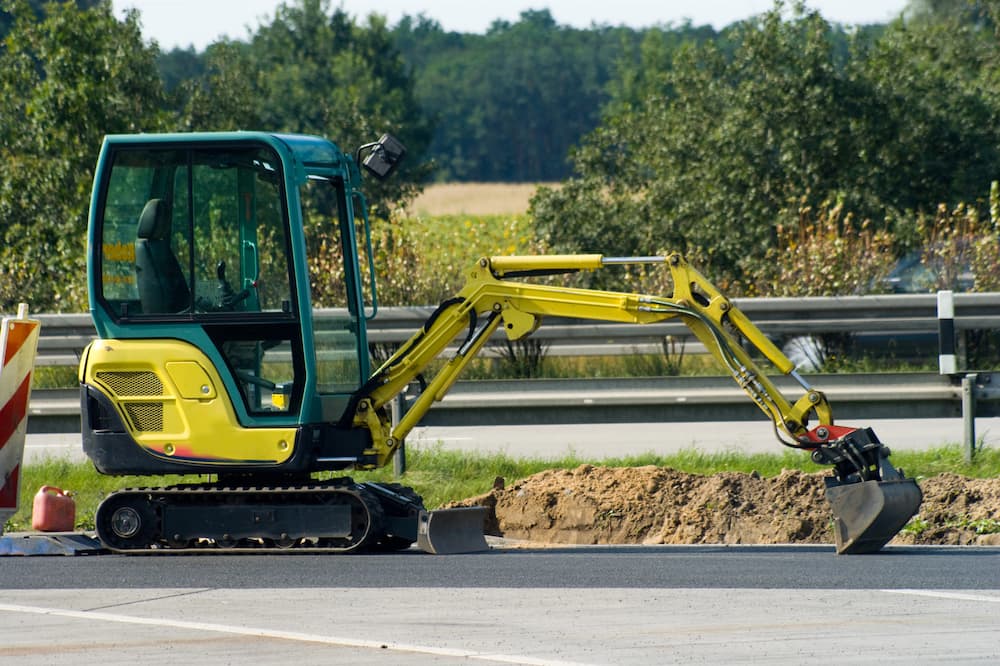
A mini excavator, also known as a compact excavator, is a versatile piece of equipment widely used in construction and for landscaping projects. Characterized by a compact design, it typically features either tracks or wheels for mobility, paired with a rotating cab that allows for a 360-degree rotation, increasing its digging efficiency in cramped spaces.
Specifically designed for precision, mini excavators are equipped with a hydraulic digging arm—which can be fitted with a wide variety of attachments—such as hammers, buckets, and augers.
Mini excavators tend to be more fuel-efficient than their larger counterparts. Their ease of transportation, storage, and nimble navigation of tight spaces makes them a go-to piece of equipment for projects where precision is needed and space is limited.
Basic Mini Excavator Specifications:
- Digging Depth: 6-15 feet on average
- Rotation Ability: Approximately 360 degrees
- Operating Weight: 4,000 - 15,000 pounds, depending on the model
A mini excavator's stability on uneven terrain is achieved through its compact design and adjustable tracks—which offer enhanced maneuverability and balance.
The difference in size and weight between backhoes and mini excavators may influence your choice for projects.
Though various sizes of backhoes exist, the average backhoe weighs around 15,000 lbs — making them substantial pieces of heavy-duty equipment. This larger size, outrigger stabilization, and weight can be useful for heavy digging operations where a robust piece of equipment is necessary.
On the other hand, mini excavators present a lighter option, with weights ranging up to 4,000-15,000 lbs depending on model. The reduced weight enhances the ease of movement and maneuverability, allowing for ease of transportation and navigating environments that may be restrictive for heftier machines.
When mobility and precision are necessary, mini excavators shine with their impressive 360-degree turning range. This full-circle maneuverability means less repositioning of the equipment during excavation—a key element for high productivity on constricted job sites.
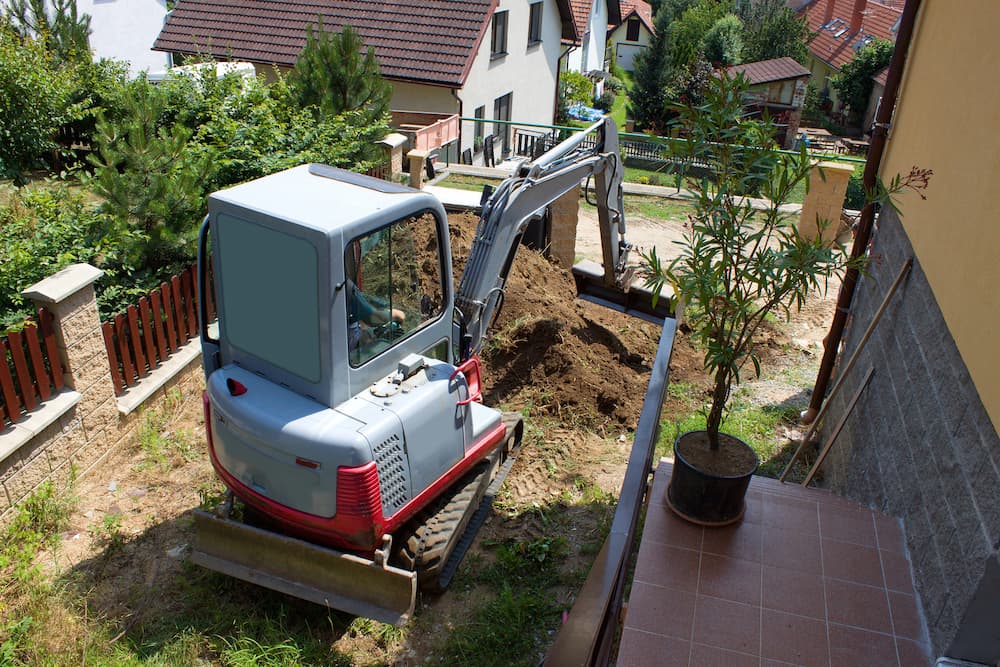
Mini excavators are incredibly maneuverable—which comes in handy when space on a job site is limited.
Conversely, backhoe loaders have a significantly limited boom pivot range of 200 degrees maximum—usually closer to 180 degrees. Because of this, backhoes may need extra space for maneuvering, which can slow down operations and impact project timelines.
Maneuverability Comparison Table
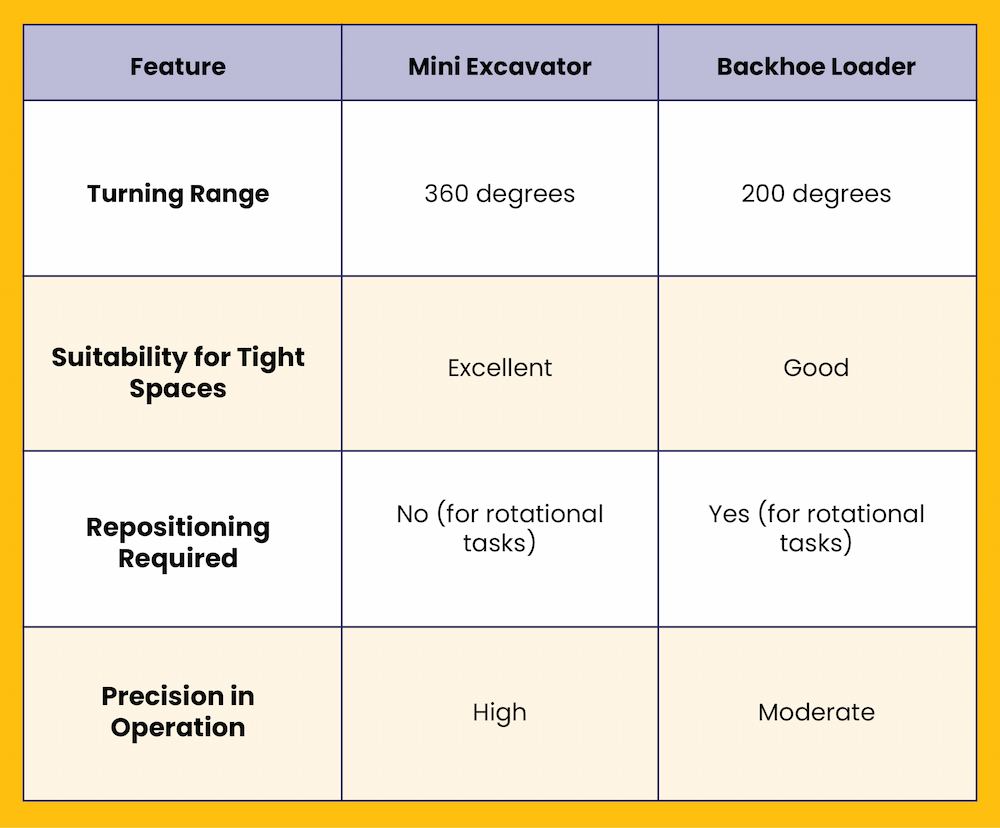
When it comes to adapting to various job scenarios, both pieces of equipment have their merits.
Backhoes: Loader Bucket Possibilities
Due to their addition of a front-mounted loader bucket, backhoe loaders boast a larger selection of attachments—allowing them to be more flexible across different projects. The ability to both dig and haul sets them apart from their mini excavator counterparts. From digging foundations to breaking asphalt, and even compacting soil, the backhoe loader is a multi-purpose machine equipped for versatility.
Types of Attachments for Tractor Backhoes
"There's a tool for every job." - Actual backhoe owner.
Backhoe loaders boast an impressive array of attachments, making them a versatile choice for projects that may involve anything from digging to lifting heavy materials.
Some of the most common backhoe attachments include:
- Augers: For drilling holes for fencing or landscaping projects.
- Breakers, Crushers, and Rippers: Allowing backhoes to easily tackle concrete demolition, tree removal, and more.
- 4-in-1 Multi-Purpose Buckets: Making short work of digging trenches and more.
- Log Grapples and Pallet Forks: For moving lumber, pipes, and other materials.
- Snow Pushers and Snowblowers: For winter weather road clearing
- Brooms and Plows: For site cleanup and roadwork
- Booms as Makeshift Cranes: With the correct rigging over the dipper stick for cargo or moving materials.
With such a robust lineup of attachments, backhoes are well-suited for a range of heavy-duty projects.
Types of Attachments for Mini Excavators
Mini excavators, despite their smaller size, are not limited in their utility. They can be fitted with a variety of attachments that enhance their performance in tight spaces or specialized tasks.
Some common mini excavator attachments include:
- Buckets with Teeth: Perfect for digging into tough soil or for demolition tasks.
- Concrete Slab Grab Buckets: Specially designed for moving large concrete pieces, very helpful in demolition or construction projects.
- Brush Cutters: Useful for clearing overgrowth and brush on job sites.
- Grinders and Breakers: Vital for breaking up concrete and other hard materials.
- Augers: Enable drilling into the earth, perfect for setting fence posts or planting trees.
- Plate Compactors: Useful for compacting soil in trenches or preparing a job site.
- Grapples: For grabbing and moving large objects or debris.
- Hammers: Provide heavy impact for breaking up rock or concrete.
This array of attachments make mini excavators powerful and nimble tools on construction sites, particularly those with spatial constraints or with a significant concern for landscaping projects.
Both Machines Depend on the Right Attachments
Carefully selecting the right attachments for either backhoes or mini excavators can help increase efficiency, reduce labor costs, and enhance the ability to handle a wider array of projects with fewer pieces of equipment.
When comparing the mobility of backhoes and mini excavators, it’s important to understand how this factor influences their application on project sites.
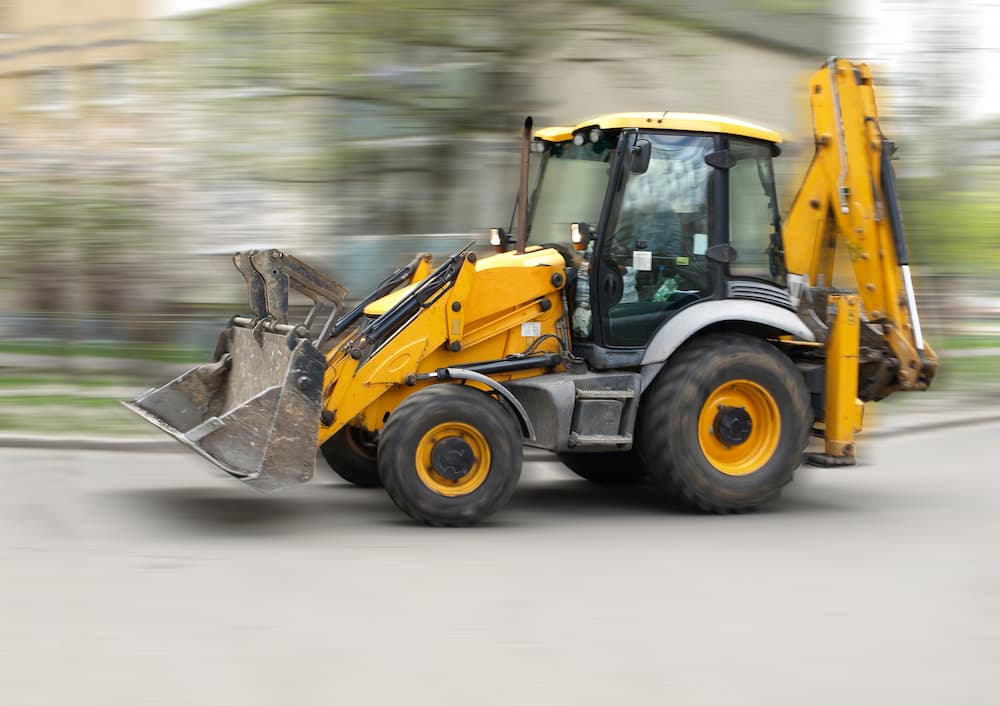
Backhoes are especially mobile—able to drive on public roads or across job sites and farms at considerable speeds.
Better Long Range Driver: Backhoes
Backhoes offer the convenience of traveling between and within job sites more efficiently—being able to be driven on roads at reasonable speeds. This makes them particularly suitable for agriculture or large-scale projects where the piece of equipment may need to be mobile across longer distances—such as farms, cemeteries, and the like.
More Nimble Navigators: Mini Excavators
When it comes to operating in tight spaces or navigating through narrow access points, mini excavators tend to be more agile than backhoes. With a compact design and a 360-degree turning radius, mini excavators work well for precise operations even in restricted areas with reduced necessary repositioning.
Despite often being hailed for their multi-purpose usage and for bearing a backhoe attachment that boosts their versatility, backhoes, on average, are generally heavier compared to mini excavators. This weight difference as well as a mini excavator's compact design make it easier to transport on a trailer from site to site.
Backhoes are best for digging, loading, and lifting.
Equipped with a bucket attachment at the front, backhoes can be used to efficiently dig trenches, foundations, or ditches as well as haul away the heavy materials. This digger-and-loader-in-one design make backhoes popular for those looking to reduce the number of machines on a farm or job site.
Mini excavators are best for precision work and nimble mobility.
Mini excavators are designed to excel in precise work in tight spaces. Their compact size and 360-degree turning radius make them ideal for tasks that require maneuverability, such as excavating in confined areas.
This being said, due to their lack of material loading capabilities, mini excavators will often require the assistance of a skid steer loader or front end loader to haul away excavated or demolished heavy material.
Here's a quick comparison overview:
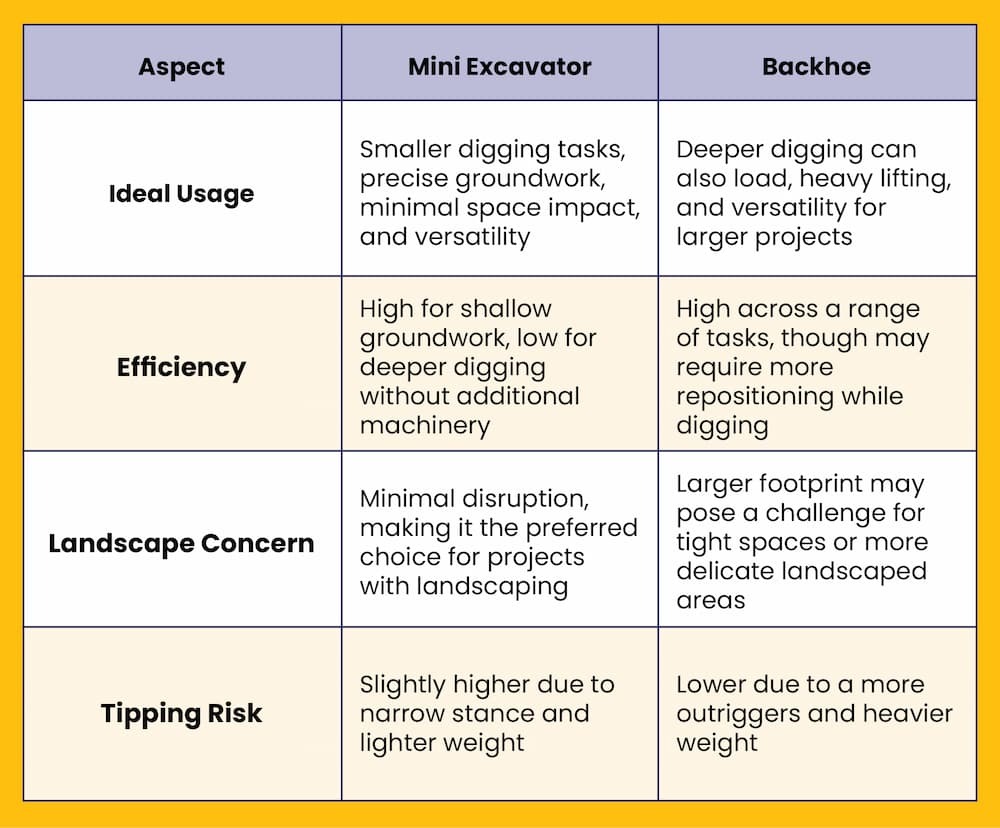
How Much Do Backhoes Cost?
The cost of an average model backhoe loader can vary widely depending on the brand, model, features, and condition. Generally, backhoes cost between $25,000 to $120,000 — so, averaging $72,500. Backhoe loader prices for used models can dip below $20,000 with the largest, higher-end models exceeding $200,000.
How Much Do Mini Excavators Cost?
The average price of a new mini excavator can run anywhere between $20,000 to $250,000 — depending on the capabilities, sizes, and brand. Used mini excavators can cost between $15,000 to $100,000.
Whether for backhoes or excavators, buying used can reduce prices by 30%-50% on average.
Which Cost More on Average: Mini Excavators or Backhoes?
On the higher end of the investment spectrum, mini excavators usually cost more than backhoe loaders. These costs tends to reflect added capabilities and advancements in technology that make mini excavators stand out.
In the end, the decision to buy either a backhoe loader or a mini excavator comes down to type of project and site conditions.
Many equipment owners and operators will recommend backhoe loaders for those looking for fewer pieces of heavy equipment capable of handling a wide variety of tasks (digging, loading, moving, etc.) in a more open space—such as on open worksites or farms.
A backhoe loader may be less specialized but it is lauded for being able to do a variety of tasks on a homestead, farm, or construction site. As one Reddit user expressed:
“A backhoe can't dig like an (mini) excavator…but it's very handy for moving what you've dug up, stone, trees, etc.”
Other owners (or even some of the same) will recommend mini excavators for those needing a nimble machine for precise, efficient work in tighter spaces—such as residential areas or cramped worksites.
For specialized work, the mini excavator may be better — as one Reddit user said:
“Like any tool, the one specified for the job performs it better.”
Ready to begin looking? You're in the right spot.
Your Source for Backhoes or Mini Excavators for Sale
Whether you're looking to buy or rent a backhoe or a mini excavator, your friends from My Little Salesman can help. Since 1958, My Little Salesman has brought together buyers and sellers of quality and affordable heavy equipment, commercial trucks, trailers, parts, and much more—all over the world.